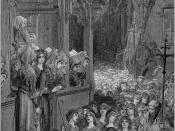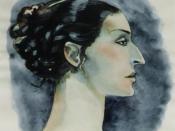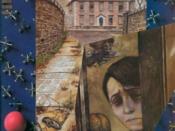This essay will discuss the novel wryd. It will explore some of the concepts
that are found in the novel and attempt to extend the issues to a point at
which they become more clear, and prove the assertion that, just as Wyrd is
a fast moving narrative that spans continents and ages, it is a novel of
ideas.
Wyrd was, in length, a short to medium novel that was written by Sue Gough.
Briefly, it was the story of Berengaria, Saladin's daughter and wife of King
Richard. After her husbands death, she was moved to a French nunnery with
her handmaiden and son, the prince (incognito). There she kept an explicit
and wise diary, recording the events in her life. She founded a healing
order, and invented a cordial that was surprisingly popular among the
village folk. She continued to practice Viking religion in subtle ways, and
encouraged spiritual openness, as opposed to the dogmatic teachings of the
time, vesting confidence and a sense of worth in her fellow devotees.
However, she was plagued by her evil anti-thesis, the Abbe De Ville, who
encouraged her son to join in a 'children's crusade' -- and unwise and
dangerous religious march. Pat, her son, was eventually sold as a slave in
the middle east, but the Abbe did not know this and told Berengaria the
'news' of his demise. Unable to cope with such a revelation, she died and
was entombed, as a mummy, with her book beneath the priory. Found by two
archaeologists in modern times, her book was recovered and her tomb
destroyed. Sent to a group of Australian women (in order to keep it out of
the claws of the modern De Ville, Professor Horniman), the book found it's
way into the hands and heart of Trace, a...


